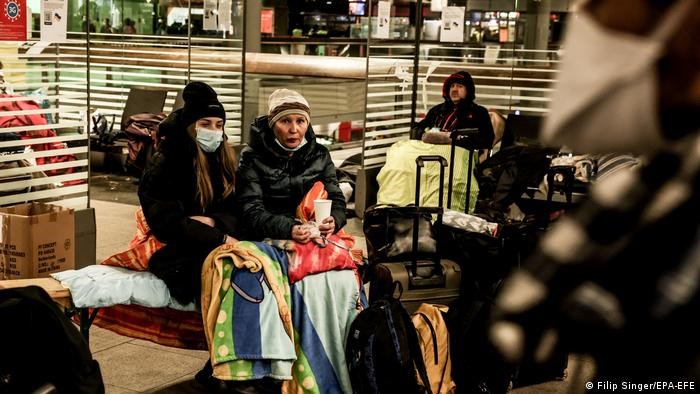Ukrainians start to feel "unwelcome" in Germany: Ukrainian ambassador
The Ukrainian ambassador to Germany reveals that Ukrainians have started to go back to their home country.
-

Ukrainian refugees in Berlin's central station (EPA)
On Monday, Ukrainian refugees began leaving Germany "long ago" as they started to feel unwelcome in the country as Ukraine awaits German approval of the Marder infantry vehicles delivery, according to the Ukrainian ambassador to Germany, Andrij Melnyk.
"Many Ukrainians started to come back long ago. More people are leaving the country [Germany] than arriving there. I assume, you should think about the reasons … I think, it is clear why many Ukrainians do not want to remain here," Melnyk was quoted by the German newspaper Bild as saying.
It is a "moral issue," according to the diplomat, adding that the war will be over "sooner or later."
"It is important for Ukraine whether the German solidarity is worth something or is not worth a penny. From our point of view... Germany daily transfers several hundred million euros to Russia. With that money, it is possible to buy 300-400 Marders. Ukraine has been waiting for a hundred [Marders] for weeks, and there is still no decision from the German chancellery," Melnyk added.
It wouldn't be too peculiar to see Ukrainian refugees unwelcome in Germany. Berlin has recently evicted war and trauma-ridden Afghan refugees to accommodate Ukrainian refugees.
Read more: Ukrainian refugees favored over others at US borders
In April, hundreds of Afghans received eviction notices from authorities over this period, with some being ordered to leave within 24 hours, without any questions or negotiations.
“The evictions purposefully weren’t publicized. Some people had lived in their homes for years and were ripped out of their social structures, including children who were moved to locations far from their respective schools,” said Tareq Alaows, a board member of the Berlin Refugee Council.
Germany is justifying these evictions by claiming that the Afghans were evicted from what authorities are calling "arrival centers" where they should supposedly be staying for a short term. However, some families have been living there for years, while others were living in places other than arrival centers.
“Few people’s living conditions improved, but most were afraid to speak up, afraid it could impact their immigration status,” Alaows said, explaining that around 10 residences had been emptied in Berlin.
Some of these families have had to move multiple times since being evicted, while Germany only offered apologies to the refugees, claiming Ukrainians needed a roof over their heads and a bed, and that the evicted Afghans were given other "permanent" accommodation of equivalent quality.

 3 Min Read
3 Min Read








